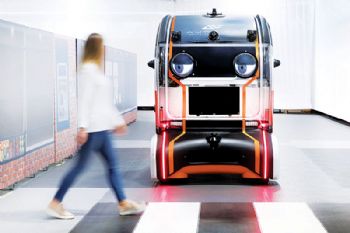
Coventry-based Aurrigo, the autonomous-vehicle division of RDM Group, has joined forces with Jaguar Land Rover (JLR) to fit friendly-faced ‘virtual pods’ to its autonomous pods to extend its understanding of how much humans will trust self-driving vehicles (
www.rdmgroup.co.uk).
As part of the engineering project, JLR (
www.landrover.com) has enlisted the help of a team of cognitivepsychologists.
The intelligent pods run autonomously on a fabricated street scene at Aurrigo’s Urban Driving Laboratory in Coventry, while the behaviour of pedestrians is analysed, as they wait to cross the road.
The ‘virtual eyes’ have been devised by a team of engineers, working in JLR’s Future Mobility division.
The pods seek out the pedestrian — appearing to ‘look’ directly at them — signalling to road users that it has identified them, and intends to take avoiding action.
Engineers record trust levels in the person before and after the pod makes ‘eye contact’ to find out whether it generates sufficient confidence that it would stop for them.
Pete Bennett, JLR Future Mobility research manager, said: “It’s second nature to glance at the driver of an approaching vehicle before stepping into the road. Understanding how this translates in tomorrow’s more-automated world is important.
"We want to know if it is beneficial to give humans information about a vehicle’s intentions, or whether simply letting a pedestrian know they have been recognised is enough to improve confidence.”